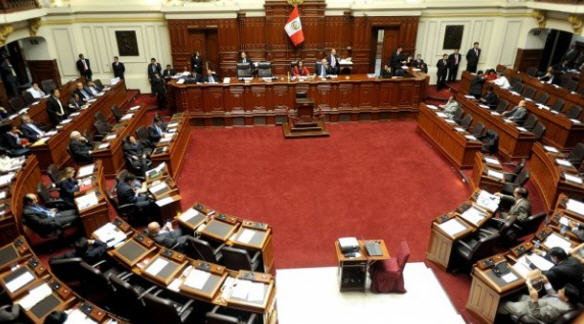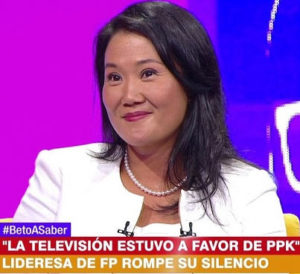 A new motion to impeach President Pedro Pablo Kuczynski is being put forth in Congress Thursday morning, as those in favor were reported to have finally garnered the requisite 26 lawmakers to sign the proposal.
A new motion to impeach President Pedro Pablo Kuczynski is being put forth in Congress Thursday morning, as those in favor were reported to have finally garnered the requisite 26 lawmakers to sign the proposal.
This motion is the second attempt to oust Kuczynski. On December 21 last year, the President was impeached on grounds of ‘permanent moral incapacity” and narrowly escaped being ousted when nine Fujimoristas led by Kenji Fujimori bucked their party line and decided to abstain from the vote.
Just days later, on Christmas Eve, the President granted a pardon to ex-President Alberto Fujimori, serving a 25-year sentence for crimes against humanity. Although Kuczynski denies it, the pardon has been generally perceived as a quid pro quo, and the left-wing Nuevo Peru and Frente Amplio lawmakers immediately called for a second motion to impeach Kuczynski.
Since then, the presidential pardon has been dropped as a reason for impeachment, and the motion focuses on three issues related to dealings with the Brazilian firm Odebrecht, embroiled in continent-wide charges of corruption: the President’s contradictions and imprecisions regarding his connections to Odebrecht; the bank transactions into his First Capital company accounts from Westfield Capital, owned by a friend and former business partner Gerardo Sepulveda for advisory services to Odebrecht; and the allegedly questionable visits made by Odebrecht’s front man in Lima, Jorge Barata, to the Finance Ministry when Kuczynski headed the portfolio during the 2001-2006 Toledo administration.
The left-wing parties Nuevo Peru and Frente Amplio, who have been leading this motion since December, are joined by the center-left parties Alianza para el Progreso and Accion Popular, as well as Apra.

Although Keiko Fujimori’s Fuerza Popular relentlessly led the first impeachment, and failed to get the requisite votes to oust the President because of defectors within its own party, it has not officially defined its position this time around. Political analysts believe the Fujimoristas are wary of losing more lawmakers to Kenji, who has now resigned from the party and is building an independent group in Congress and has made it clear he does not back the impeachment. Proof of that possibility is seen in Keiko Fujimori’s rare televised appearance earlier this week, the first in over 18 months, in which instead of backing the impeachment she suggested the “President of the Republic should step down” and leave the job to his first vice-president, Martin Vizcarra.
Until late last year, Fuerza Popular had an absolute majority with 73 lawmakers (of a total of 130 seats in Congress) but it is now down to 60 — at least three were expelled and the rest have resigned to follow Kenji Fujimori, who has known how to attract members of the Fujimorista party who feel marginalized by the more rigid leadership of his sister Keiko.
A total of 87 votes are required to oust the President.
Housing minister Carlos Bruce doesn’t believe the impeachment will be successful. Although the 26 lawmakers proposing the impeachment come from five different political parties, there is still no consensus even within those parties.
Ricardo Narvaez of Alianza para el Progreso, one of the parties backing the impeachment, said there were several within his party that disagreed with the reasons for impeachment, claiming that the real reason is the presidential pardon and that the left-wing Nuevo Peru and Frente Amplio are masking the motive behind the Odebrecht allegations. Also, Accion Popular spokesman Victor Garcia-Belaunde said his party will make their decision only after President Kuczynski answers questions, on March 16, from the congressional ‘Lava Jato’ commission investigating the Odebrecht corruption.






Could it get any more complicated? This being Peru I suppose it could.
Clearly, Kuczynski is Peru’s Trump. The messianic attitude that characterizes them undoubtedly will be carefully analyzed and studied by presidential historians, but at this juncture in history, the feeling one gets as a man on the street regarding their perception of their own value, rights and powers is one of being above the law, of being omnipotent. In Kuczynski’s case, the idea that anyone can hold public office, in Peru, or indeed anywhere, and double dip from the State’s coffers and those of State contractors, in any form, be it commissions for services or not, directly, or indirectly through third parties, in exchange for assigning State contracts or the granting of other benefits to such contractors, regardless of their amount, is patently ridiculous and constitutes evidence of moral turpitude, an irreversible condition that clearly disqualifies him from discharging his presidential duties. In my understanding, Peru’s constitution sanctions several reasons for presidential impeachment and removal from office, which includes the notion of permanent moral incapacity. In my view, sadly, this condition has been amply evidenced by Kuczynski in his various ministerial and administrative functions to date, beginning at least as of Toledo’s administration of 2001-2005.